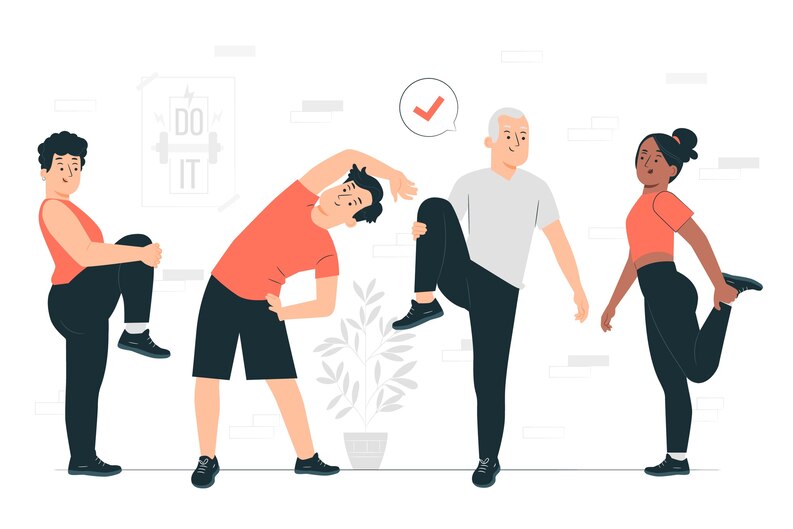Embracing an active lifestyle is one of the best things you can do for your physical and mental health. However, the human body thrives on movement, and the benefits of regular exercise go far beyond just looking good. In this blog, we’ll explore the myriad advantages of staying active, the magic that exercise brings, and how to incorporate fitness routines into your daily life.
Fact Sheet
The Centers for Disease Control and Prevention (CDC) suggests that adults aim for a minimum of 150 minutes of moderate-intensity aerobic activity. Additionally, they advise adults to engage in muscle-strengthening exercises targeting all major muscle groups for at least two days a week.
If you are new to physical activity, start slowly and gradually increase the amount of time you are active each day. You should also talk to your doctor before starting any new exercise program, especially if you have any health conditions.

The Power of Physical Activity
1. Boosts Mood and Mental Health
Exercise is not just a workout for the body; it’s a tonic for the mind. Physical activity triggers the release of endorphins, often referred to as the “feel-good” hormones. These endorphins help alleviate stress, reduce anxiety, and combat depression, promoting overall mental well-being.
2. Enhances Physical Health
Engaging in regular physical activity is a cornerstone of good health. It strengthens the cardiovascular system, improves blood circulation, and lowers the risk of chronic conditions such as heart disease, diabetes, and obesity. Exercise also bolsters the immune system, helping your body ward off illnesses.
3. Increases Energy Levels
Counterintuitive as it may sound, expending energy through exercise actually leaves you feeling more energized in the long run. Regular physical activity improves your body’s efficiency in delivering oxygen and nutrients to your cells, increasing your stamina and vitality.
4. Supports Weight Management
Physical activity plays a pivotal role in weight management. It helps burn calories, build lean muscle mass, and rev up your metabolism. Incorporating exercise into your routine, along with a balanced diet, can contribute to achieving and maintaining a healthy weight.
Staying Active in Everyday Life

1. Incorporate Movement
Breaking Long hours of sitting can take a toll on your health. Set alarms to remind yourself to stand up, stretch, and move around for a few minutes every hour. These movement breaks can help prevent stiffness and promote blood circulation.
2. Choose Active Transportation
Whenever possible, opt for active modes of transportation. Walking, cycling, or even using public transport involve more physical activity than sitting in a car. Not only will you stay active, but you’ll also reduce your carbon footprint.
3. Make It Social
Combine exercise with social activities to make it more enjoyable. Join a sports team, go for a hike with friends, or take a dance class. Social interactions can make staying active feel like less of a chore and more of a fun experience.
4. Household Chores Count
Believe it or not, household chores contribute to physical activity. Vacuuming, gardening, cleaning, and other daily tasks involve movement and can help you stay active without setting aside specific workout time.
Crafting Effective Fitness Routines
1. Set Clear Goals Determine what you want to achieve through exercise. Whether it’s improving cardiovascular fitness, building strength, or increasing flexibility, having clear goals can guide your fitness routine.
2. Mix It Up Variety is the spice of fitness. Incorporate a mix of aerobic exercises (like running, swimming, or cycling), strength training, and flexibility exercises (such as yoga or stretching) into your routine. This not only keeps things interesting but also targets different aspects of fitness.
3. Start Slow and Progress Gradually If you’re new to exercise, don’t jump into an intense routine right away. Begin with light to moderate activities and gradually increase the intensity and duration as your fitness level improves. This approach reduces the risk of injuries.
4. Prioritizing Rest and Recovery Rest is as crucial as exercise. Your body needs time to recover and repair itself after workouts. Incorporate rest days into your routine to prevent burnout and allow your muscles to heal.
Final Words
Physical activity is a gift we give our bodies, and its benefits extend far beyond the physical realm. From boosting mood to enhancing overall health, exercise works its magic in countless ways.
By integrating movement into our daily lives, embracing an active lifestyle, and crafting personalized fitness routines, we can unlock a life filled with vitality, happiness, and well-being. So, lace up those sneakers, step out, and let the journey to a healthier, more active you begin.






